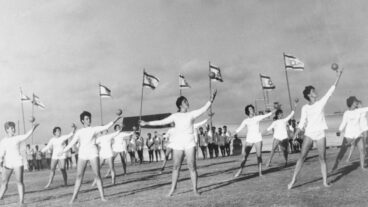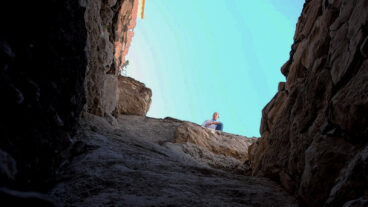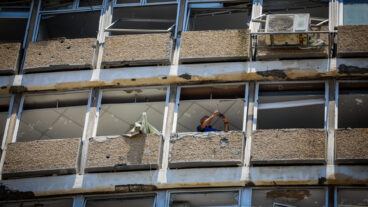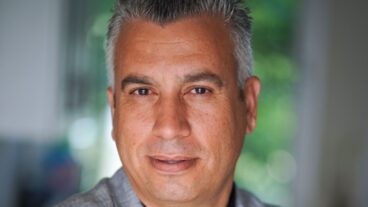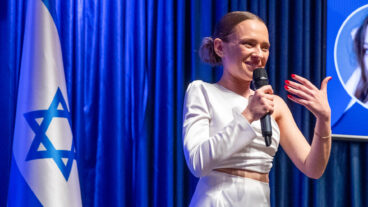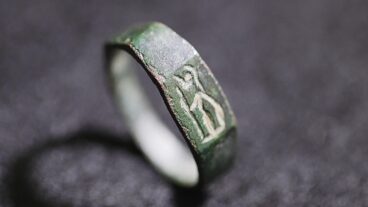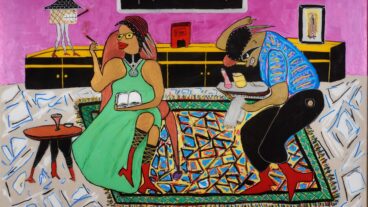Members of the Bir El Maksur branch of Hanoar Haoved V’halomed – the movement has opened a variety of doors for those of deprived socio-economic backgrounds. Mayada Gidwer, a Bedouin Israeli from the Galilee village of Bir El Maksur, had spent her first 18 years in the confines of her village. Outside of interacting with a few residents from neighboring Jewish communities, she had never met any other Israelis.
But thanks to a vibrant social youth movement called Hanoar Haoved V’halomed (the Labor Union for Youth), Gidwer and the other young residents of Bir El Maksur have been exposed to the mosaic of Israeli society and have begun a vital integration process that includes meetings with Jewish, Christian and other Muslim Arab Israelis.
“Now we meet Israelis from all over,” said Gidwer, now 21, and a Hanoar supervisor in her village.
Gidwer’s father, a youth leader for the village, wanted his son to work with Hanoar. But since he was under 18, the family leader turned to his daughter Mayada, an unusual move in a traditional Bedouin family. She trained with the Ministry of Education and when the first Hanoar groups opened in her village they were immediately popular.
“It started very well,” said Gidwer. “Both parents and children were impressed with the blue shirts, with the organization of activities. From the start, we had two groups per year, covering ages six to 14.”
In 2003, two Jewish Israelis from the Hanoar chapter at Kibbutz Hanaton, spent their alternate army ‘service year’, in Bir El Maksur in order to strengthen the Hanoar groups in the village.
The ‘service year’ is an important aspect of Hanoar’s goals, and consists of high school graduate Jewish and Druze Hanoar activists who postpone their military service to volunteer in informal educational activities in all the movement’s centers, and work closely with schools to help the Bedouin youth focus on the future.
Gidwer explained the significance of this work by noting that out of the 80,000 inhabitants of her village, only 70 attend university. Participating in Hanoar helped her crystallize her desire to strive for higher education and to focus the direction of her studies: education and geography.
“Through them I was able to decide what to study, what to work in,” she told ISRAEL21c.
Once they complete their volunteer year of service, the Hanoar members join a Hanoar IDF Nahal core group of Jewish and Druze soldiers in a branch of the military that over the years has influenced the IDF to expand to meet the needs of the country’s youth. At the end of their service, they usually join social and educational missions within framework of Hanoar.
Established in 1924, Hanoar has opened a variety of doors for those of deprived socio-economic backgrounds and has been active within the Arab sector since 1983. In addition to weekly meetings within communities, camps, excursions, and seminars, the labor union maintains a professional training network, in cooperation with public and governmental institutions, and is the legal representative of employed youth, concerned with their organization, education, and professional life, as well as the defense of their rights, health and welfare. Hanoar also operates a technological-educational network for young school drop-outs.
The movement’s stated mission is ‘to develop models of cooperative life, to assist the weaker social sectors, to absorb immigrant youth, and to continue the struggle for the image of Israeli society as a more just society, egalitarian, democratic, tolerant, Zionist, and peace loving.’
Today, Hanoar’s membership comprises Jews, Druze, Bedouin and other Arab Israelis – both Muslim and Christian. Hanoar’s approach is democratic and peaceful, with the emphasis on continual striving for full equal rights within the communities it services, as well as full integration into Israeli society.
Presently there are five Bedouin chapters in the north of Israel. There are also plans to renew a presence in Rahad and Ksefi, Bedouin villages in the South where the movement was active seven years ago, but closed its chapters there for lack of funding, Tony Nasser, head of the Arab Sector of Hanoar, told ISRAEL21c.
There are now 400 members of Hanoar in the Bedouin village of Bir El Maksur, divided into 10 groups, seven of which include only girls. The leaders, two per group, are in the 11th and 12th grades, and are mainly girls. They meet every Tuesday, as do all chapters of Hanoar.
“Excursions to other parts of the country are an important component of the activities of Hanoar,” said Nasser, who has been part of the movement for 21 years. He said that Hanoar takes children as far afield as Eilat, the Dead Sea, the Judean Desert and the North, as well as providing quality summer camps.
Although it was at first difficult to convince Bedouin parents to allow their children to go on these outings, Gidwer added, once the children come back, their elders also benefit from these new experiences. “The kids are happy so the parents lend their support,” she said.
“For instance, when a boy comes back from a trip he says ‘I met a boy from Ein Rafa.’ The father asks ‘Where is Ein Rafa?’ and dialogue and education begin,” said Gidwer.
In the summer Hanoar hosts a five-day seminar called Tnua Ehad (One Movement), that includes members from all sectors of Israeli society, including Jewish, Druze, Bedouin and other (non-Bedouin) Arabs.
“We discuss the possibilities of coexistence between all sides of society,” said Nasser. “Our youth movement is a federation of all the sectors in Israel and the only youth movement that works in the Arab sector, with equality of membership, although the organization is Jewish,” he says.
“Even during the weekly meetings of Hanoar,” explains Nasser, “the point is to open the minds of these children to the items we are discussing.”
In addition to the Bedouin community in Israel, Hanoar reaches out to the broader Muslim and Christian Arab sector. Out of the 100,000 countrywide members of Hanoar, there are 18,000 members in 24 locations in the Arab sector, including Nazareth, East Jerusalem, and many smaller villages and towns.
“In the Arab sector we speak in Arabic,” said Nasser. “We preserve the language, and work with a lot of sensitivity towards the tradition and the customs. In some places we work with boys and girls separately. In a couple of villages we have girls as leaders. We want to establish equality for girls within the villages, to support them in their ability to achieve good positions in life.”
Bahaye Jubran, 26, from the Arab Israeli village of Reni (made up of 20 percent, Christians and 80% Muslims), holds a bachelors degree in Social Work and is currently studying for her Master’s in Political Science at Haifa University. She was in her third year of Social Work when she was assigned a community project.
“I did one for the University and decided to do another for my village,” says Jubran.
She conducted research on the informal activities available for the 5,000 children in Reni and found there was nothing at all. Then she met a relative of a classmate who was a branch leader in Ein Mahal, a village near Reni. He explained to Jubran that Hanoar could help her community. She wrestled for an entire month with the notion of initiating a chapter of the Jewish youth movement in her village. Finally she called the relative and was put in touch with Nasser.
“I talked to Tony. At the beginning it was very difficult, I didn’t have a place to hold activities. I went to the local council in Reni and asked the mayor for a place. He refused because I am not connected in politics, nor do I belong to a large family.”
Jubran got herself interviewed by her local paper, Kel Arab and once the article was published, it put pressure on the local council to pay for a place for the children to hold meetings and activities. Today Hanoar has 20 youth groups in Reni serving a total of 350 children.
Jubran, who has worked with other coexistence groups, was extremely moved on a Hanoar trip to Auschwitz in 2003 in which Arabs and Jews participated. The leader addressed his first words to the group in Arabic, calling them, “my friends, my brothers.”
This was an epiphany for Jubran, who believes in Hanoar, “because I am now part of a larger family. I would like all of Israel to be like Hanoar. I told Tony the Israeli flag is not my flag, but the flag of Hanoar is. They have something to give to Jews and Arabs, to teach them to live together. They believe it, they do it.”
Gidwer echoes her sentiments. “If, based on the model of Hanoar,” she said, “all Israelis can meet in a single group, we can come up with a single philosophy for all of us. The credo of Hanoar is ‘Hanoar L’avoda (Youth for Work), L’hagana (for Defense) ve L’shalom (and for Peace)’.”




